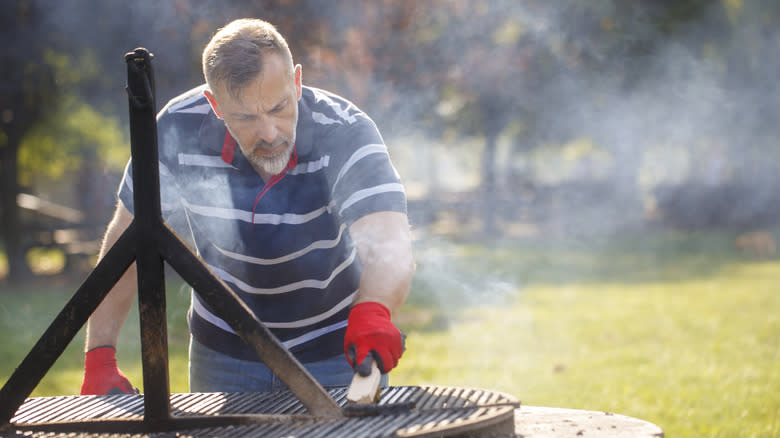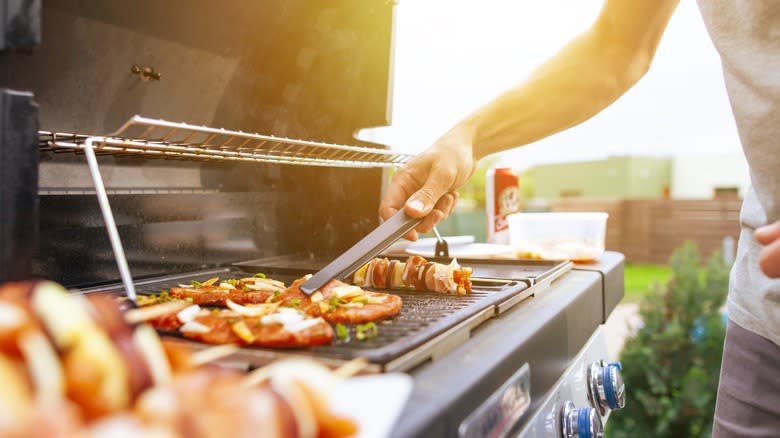The Biggest Mistakes People Make When Grilling, According To Robert Irvine - Exclusive

- Oops!Something went wrong.Please try again later.
Grilling sounds simple. Meat goes on a grill, right? Not quite. If you've ever served up over-cooked steak, bitten into a dry burger, or left shreds of chicken stuck to your grates when you tried to flip the meat, you've learned from experience that there's a little more to grilling than just food and fire. Thankfully, there are experts to help you out. In an exclusive interview with Mashed, Chef Robert Irvine talked us through the biggest mistakes people make when grilling at home, including cooking with a dirty grill, not prepping the meat, and rushing the process.
When you're looking to make the most of your favorite grilling recipes for your next cookout, it all starts with the star of the show: the grill itself. Irvine emphasizes the importance of properly preparing your grill before trying to cook anything on it. Get your grill warm to loosen up any food remnants, then give the grates a good scrub. Finally, wipe it down to remove the debris. Why? "Because whatever you cooked on it before, even though you heated it up, it's not burnt off," says Chef Irvine. If you don't get your grill nice and clean, you'll wind up with burnt bits left over from the last time you cooked -- probably not the flavor profile you were going for.
Read more: Cuts Of Steak, Ranked Worst To Best
Don't Forget To Prep The Grill

Once your grill is clean, take out an insurance policy against stuck food. According to Chef Robert Irvine, you want to have a light hand with the oil. "You don't need to put a smearing of oil all over the meat. You only put the oil on the grill because if you've used a dry rub, it will burn the minute you put it onto the dry heat of the metal," he explains. Out of all the kinds of cooking oil out there, Irvine recommends grapeseed oil for its neutral flavor and higher smoke point -- ideal for high-heat cooking like grilling.
Irvine suggests using a rag to apply the oil, which allows you to use less oil than if you put it directly on the meat, and keeps your rub and seasoning in place. It may not look like enough lubrication to prevent the meat from sticking, but that leads us to another of Irvine's can't-miss grilling tips. Once the meat is on the grill, don't mess with it! That means no pressing and no constant checking for doneness. Says Chef Irvine, "Men tend to squash [meat] down to try and cook it faster, and then they ruin it." Pressing the meat squeezes out the juices and gives you dry, flavorless results. Irvine's advice? Let the meat do its thing. Once it has caramelized and browned, the meat will release easily from the grates.
Keep An Eye On The Temperature

To get the best results, be sure to prep the meat you'll be cooking. Start by allowing the food to come to room temperature -- especially if you're cooking a protein. This can take about an hour. "There's nothing worse than putting something cold onto a hot grill because it steams and doesn't sear, just like a hot pan," Chef Robert Irvine explains.
Of course, searing isn't everything. To avoid achieving a perfect crust but still having raw meat in the middle, either lower the temperature or move your meat to a cooler spot on the grill. Says Irvine, "Start off with a high temperature, get it seared on both sides and then we reduce the temperature and close the door. Don't keep opening and shutting the grill, you'll ruin the meat."
Finally, don't forget about carryover cooking. The residual heat will continue to cook the meat after you've removed it from the grill, so you want to take your meat off the grill just shy of the final temperature you're after. For a medium-rare steak, that means you should remove it from the grill at 115-120 degrees Fahrenheit before allowing it to rest. "Let it rest for 10 minutes," says Irvine. "It will taste a lot better when you cut into it because it won't bleed everywhere across your board or your plates." Irvine's final advice: Be patient and pay attention, because "Meat will tell you when it's ready."
Read the original article on Mashed.

